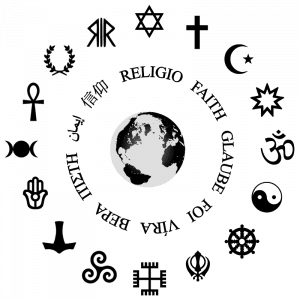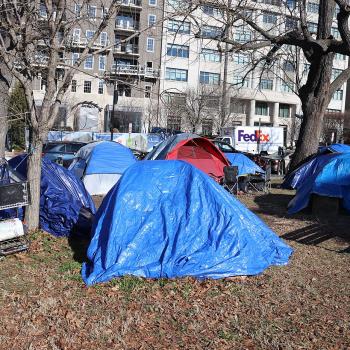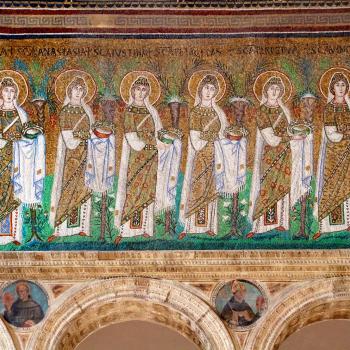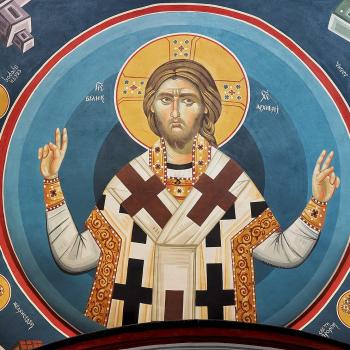
Religious freedom is fundamental. But, affirming its value, we must not misconstrue what religious liberty is about. It is not the freedom to do anything and everything we want under the name of religion. It is not, moreover, the freedom which one has thanks to being in a state of power which gives some particular religion domination over others. Certainly, we can seem to be free when we are in power, when others, because of our power, cannot dictate to us what we can or cannot do (while we can dictate to others what they can do), but that is not true freedom, for if our freedom is based upon the kind of power we wield in the world, then religious liberty only posits freedom as a zero-sum game in which only one religion has true power and liberty. Religious liberty is not just for people of one religious faith, but all. Likewise, when freedom is understood only in relation to power, then it is obvious that those who lose that power will feel that they have lost freedom, and will decry the loss of religious liberty when they lose that power, not because religious liberty has been violated, but because their domination has been rejected.
This confusion concerning religious liberty explains the way many in Western society, especially in the United States, discuss religious liberty and do so in ways which violate its principles. They will promote it, when they see it is to their own private advantage, but they often reject it when the rights of others are being infringed because such infringements go with their own private desires. That means they will decry the loss of their power in society, and equate that as a loss of religious liberty, while ignoring true violations of religious liberty, such as in the way Muslims are mistreated by secular authorities (exemplified in the United States by the way many Christians supported Trump’s so-called “Muslim travel ban”). They are confusing religious liberty with religious domination, and they want to continue to dominate society with their ideals, ideals which go beyond basic rules of justice but instead follow their own particular interpretations of their religious faith.
What does religious liberty entail? According to Dignitatis humane, it is the ability to practice and live out one’s faith, free from external coercion, so long as that faith does not go against basic principles of justice:
This freedom means that all men are to be immune from coercion on the part of individuals or of social groups and of any human power, in such wise that no one is to be forced to act in a manner contrary to his own beliefs, whether privately or publicly, whether alone or in association with others, within due limits. [1]
This is why those who equate religious liberty, and understand it, in relation to the power of religion to assert itself over society, have failed to follow religious liberty and instead promote its antithesis. It is worse than a farce, because it uses the language of religious liberty, but does so in order to entirely undermine its very principle. Religious liberty is not based upon power, and the principle behind it entirely rejects people trying to force their religion upon others through any and all forms of power and control. Religious liberty as a right, is a right for all, and any attempt to use religious liberty to undermine the rights of others is a violation of religious liberty itself:
Religious communities also have the right not to be hindered in their public teaching and witness to their faith, whether by the spoken or by the written word. However, in spreading religious faith and in introducing religious practices everyone ought at all times to refrain from any manner of action which might seem to carry a hint of coercion or of a kind of persuasion that would be dishonorable or unworthy, especially when dealing with poor or uneducated people. Such a manner of action would have to be considered an abuse of one’s right and a violation of the right of others. [2]
This is why, when a religious tradition tries to unjustly impose itself on others, violating the rights of others, it is not a violation of religious liberty, but its affirmation, to reject such an abuse of power. And this is also why a state can, and should, interject itself when religious liberty is being violated. We must acknowledge it is not a violation of religious liberty for the state to halt such injustice. Indeed, the state is only affirming its role in the promotion religious liberty as it guarantees basic rights for all:
Provided the just demands of public order are observed, religious communities rightfully claim freedom in order that they may govern themselves according to their own norms, honor the Supreme Being in public worship, assist their members in the practice of the religious life, strengthen them by instruction, and promote institutions in which they may join together for the purpose of ordering their own lives in accordance with their religious principles. [3]
Religious people must recognize and respect the demands of justice found in the public order. It is not a violation of religious liberty for the state, in an emergency situation, to demand the public to do what is necessary to deal with that emergency, even if it means, halting some religious practice or observance:
Furthermore, society has the right to defend itself against possible abuses committed on the pretext of freedom of religion. It is the special duty of government to provide this protection. However, government is not to act in an arbitrary fashion or in an unfair spirit of partisanship. Its action is to be controlled by juridical norms which are in conformity with the objective moral order. These norms arise out of the need for the effective safeguard of the rights of all citizens and for the peaceful settlement of conflicts of rights, also out of the need for an adequate care of genuine public peace, which comes about when men live together in good order and in true justice, and finally out of the need for a proper guardianship of public morality. [4]
This can be seen both in particular situations, such as when the state will order blood transfusion to save the life of a child over the objections of the religious beliefs of their parents, but also in other, more generalized, situations, such as when a pandemic is spreading across the land, and quarantines and lockdowns are necessary in order to save lives. If the general religious traditions of the world are explored, they can be shown to make room for such emergencies; in the Christian tradition, we have the example of the parable of the Good Samaritan; in it, Jesus shows that religious obligation to worship God is fulfilled if someone, instead of going to their religious service, does what they can to save the life of someone they meet along the way to their religious observance. This tells us that taking care of our neighbor, and looking after their welfare, takes precedence when it comes in conflict with religious obligations such as going to church on Sunday (which is also why those who are sick are usually exempt from such obligations).
Religious liberty, therefore, should not be understood under the mantle of power, and its loss is not felt when a particular religious authority loses its preferential place in secular society. Those who decry that loss confuse the liberty which power gives with the real liberty which transcends all such power. Sadly, many Christians, having experienced such power in society, now confuse the loss of that preference with persecution and the loss of their own religious liberty. But again, the role of the state is to promote religious liberty for all, making sure that people are free to live as they wish, according to what their conscience dictates, so long as social norms and the common good are not infringed by the practices of people of any particular religious tradition. Social norms in a secular state will be, by their nature, different from the particular norms of any single religious group (though, because most religions are interested in justice, there will be many elements which are shared in common). Religious liberty is not violated when people are told that they cannot use their religious norms as a tool to force or coerce others in society, but of course, the reverse is also true. People of faith should be free to practice their faith, and not be coerced by society, so long as the public good remains intact:
Religious communities also have the right not to be hindered, either by legal measures or by administrative action on the part of government, in the selection, training, appointment, and transferral of their own ministers, in communicating with religious authorities and communities abroad, in erecting buildings for religious purposes, and in the acquisition and use of suitable funds or properties. [5]
If a particular religious community has violated the common good, expecting them to change their ways and make reparations for those violations, must not be seen as a rejection of religious liberty, but a part of what is necessary for its affirmation. Thus, people of faith must not confuse social justice and how it affects their own particular community with violations of religious liberty if such justice seeks to correct a wrong promoted by that religious community.
Of course, religions might find themselves in conflict with the social norms of their society. If they do so, they must first not push their own beliefs upon society as a whole. Secondly, they must demonstrate why their view promotes the common good better than social norms; if they can, then they can continue in their practice, promoting it while pointing out that it is a true violation of religious liberty to tell them to stop. Thus, when Christians were told to sacrifice to Caesar, it was a violation of their religious liberty to try to coerce them to do so, for it was the promotion of another religious faith and tradition over their own. Religious liberty is important because it promotes not just the rights of the state, not just the rights of secular society, but also the rights of people within particular religions to practice their faith, but it does so by telling all involved that there is a limitation to their power to coerce others to follow their own ways, whether it is a secular or religious authority.
Freedom, including religious freedom, can only be observed in and with justice. Those who violate justice, whether or not it is some secular authority (such as when President Trump used force to attack the clergy of St John’s Episcopal Church, to take over the church for his own self-promotion), or some religious authority (such as when religion leaders gained some power, thanks to colonialism, and used that power to destroy the cultures of others), have already rejected religious liberty. But it is also a rejection of religious liberty to not work for justice, because with the removal of justice in society, religious liberty will likewise be infringed. Thus, those who want to promote religious liberty must do more than speak of religious liberty, and their own rights, they must speak on the rights and needs of others, as Pope St. John Paul II did:
It will always remain one of the glorious achievements of this nation that, when people looked towards America, they received together with freedom also a chance for their own advancement. This tradition must be honored also today. The freedom that was gained must be ratified each day by the firm rejection of whatever wounds, weakens or dishonors human life. And so I appeal to all who love freedom and justice to give a chance to all in need, to the poor and the powerless. Break open the hopeless cycles of poverty and ignorance that are still the lot of too many of our brothers and sisters; the hopeless cycles of prejudices that linger on despite enormous progress toward effective equality in education and employment; the cycles of despair in which are imprisoned all those that lack decent food, shelter or employment ; the cycles of underdevelopment that are the consequence of international mechanisms that subordinate human existence to the domination of partially conceived economic progress; and finally the inhuman cycles of war that springs from the violation of man’s fundamental rights and produces still graver violations of them.
Freedom in justice will bring a new dawn of hope for the present generation as it has done before: for the homeless, for the unemployed, for the aging, for the sick and the handicapped, for the migrants and the undocumented workers, for all who hunger for human dignity in this land and in the world. [6]
Religious liberty is a fundamental right, but, like all rights, it is interconnected with all the other rights and responsibilities expected of us. When justice is lost, religious liberty is lost. When we ignore justice, especially using some religious principle to do so, we should not be surprised if we come to face the consequences of our injustice with some sort of loss of our own. If we feel that our religious liberty is violated as the consequences of what happens to us for our own violations of justice, the solution must be to change our ways, to promote justice, and then, and only then, see if our liberty remains violated or not.
[1] Dignitatis humanae. Vatican translation. ¶2.
[6] St. John Paul II, “Speech During His Visit to Battery Park” (10-3-1979). ¶3.
Stay in touch! Like A Little Bit of Nothing on Facebook.
If you liked what you read, please consider sharing it with your friends and family!

















